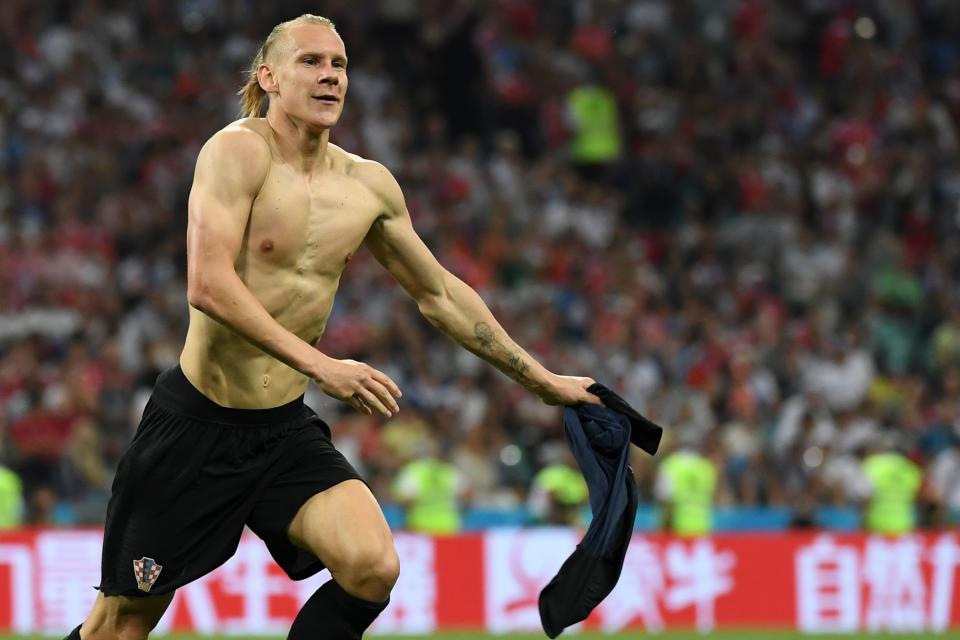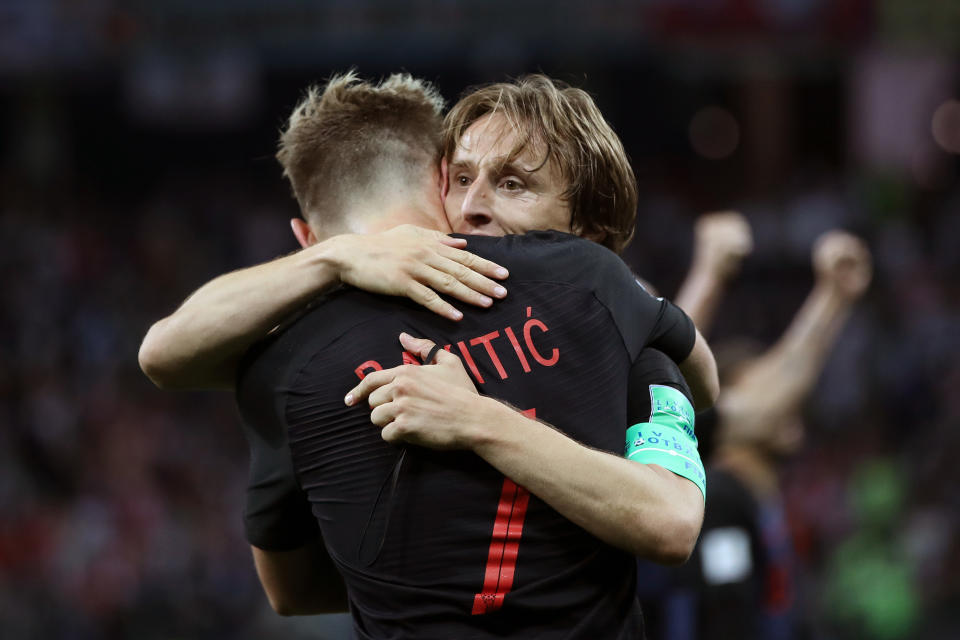Likable Croatia's checkered past rears its head leading into England clash
With no United States Men’s National Team to cheer for and many of international soccer’s usual heavyweights having already fallen short, neutrals have been on the lookout for a team to glom onto at this summer’s World Cup. If there’s one side remaining in the tournament that’s earned a surprising number of new fans, it’s probably Croatia.
Despite hardly even being regarded as a “dark horse” in the lead-up to the tournament, the team stormed through the group stage, winning all of its matches and handing Lionel Messi’s Argentina a 3-0 defeat it never really recovered from, before coming through the knockout stages with penalty wins against Denmark and Russia. Along the way, it played some of the most attractive, flowing soccer we’ve seen at this World Cup.
With a world-class midfield, anchored by Real Madrid’s Luka Modric and Barcelona’s Ivan Rakitic, a workhorse of a striker in Mario Mandzukic, and a goalkeeper who’s stood strong through two penalty shootouts, there’s a lot to like about this team. And on a purely aesthetic basis, Croatia’s instantly recognizable red-and-white checkered jersey is one of the most iconic in the game.
But Croatian soccer also has a dark side.

International soccer in the Balkans is fraught with complexities. Political, ethnic and social divisions are frequently manifest as sporting ones. In a World Cup held in Russia, the former seat of power in a part of Europe that was once bound together under Soviet rule, these divisions are naturally more pronounced.
Look closely, and you can see there’s been a clear undercurrent running through this entire World Cup of lingering grievances being aired from the bloody Balkan conflicts of the 1990s and beyond. The goal celebrations of Albanian-Kosovan Swiss players Xherdan Shaqiri and Granit Xhaka, the neo-Nazi banner unfurled by Russian fans, and more recently, the controversy that erupted when Croatia defender Domagoj Vida posted an online video in which he shouted “Glory to Ukraine!” following the team’s quarterfinal victory over Russia.
That particular slogan is often associated with Ukrainian ultra-nationalists and can be interpreted as antagonistic towards the host nation, which maintains an ongoing military intervention into Ukraine.
FIFA regulations explicitly prohibit players from using the World Cup as a platform for making such political statements. Predictably, Vida’s statement drew widespread criticism in Russia, and there were even calls for the center back, who plays his club soccer at Besiktas in the Turkish league, to be sent home.
Ultimately, Vida apologized and FIFA declined to take action against him. But Ognjen Vukojevic, the assistant coach who appeared alongside Vida in the video, was not so lucky. The former national team player turned coach was sacked by the Croatian FA and sent home.

Vida is far from the first player at this World Cup to escape significant punishment for violating the rules about political statements. And this is apparently not the first time at this tournament that FIFA seems to have turned the other cheek when it comes to Croatia.
According to a report in the Telegraph, FIFA covered up an incident earlier in the tournament when Croatia’s federation was warned after fans displayed a fascist banner during a Group Stage encounter with Nigeria. FIFA’s disciplinary committee which has fined Russia after fans displayed a similar banner, and Denmark, after fans displayed one deemed as sexist, let Croatia off with a warning and seems to have downplayed the incident.
While some of Croatia’s new admirers have been rightly impressed by the team’s attractive soccer and dogged mentality, those who follow the sport in Europe more closely will be all-too-aware of Croatia’s unfortunate history with this sort of behavior from fans, and even at times, players.
In 2015, a swastika appeared emblazoned on the pitch at Poljud Stadium during a Euro qualifier against Italy that was already being played behind closed doors as punishment for previous fan behavior. As a result, Croatia was docked a point in qualification and its next two matches were also played in empty stadiums.
Croatia still managed to qualify for Euro 2016 but wound up being fined over $117K after fans displayed racist and fascist flags at the tournament in France that summer. Even when qualification for this World Cup began, Croatia was being made to play behind closed doors as punishment for racist chants made during friendlies against Hungary and Israel.
At the previous European Championship, four years earlier, Croatia was again fined after its fans directed racist chants at Italy striker Mario Balotelli, an Italian citizen of Ghanaian descent. And it’s not just the fans.
In 2013, Croatia defender Josip Simunic was given a 10-match ban after leading fans in a fascist chant following a 2-0 win over Iceland in World Cup qualifying.
Simunic’s ban might have presented a golden opportunity for the Croatian soccer federation and its president, former national team great Davor Suker, to make an example of him and a bold statement about stamping out racist behavior. Instead, Suker criticized the ban as being overly excessive. Simunic was later appointed assistant manager of the national team.

While Modric, Rakitic and the rest of the current team of Croatia players representing their country at the World Cup this summer are by no means responsible for the actions of some of their fans, it does beg the question why FIFA seems to be giving Croatia a pass while punishing others. Although it would be inaccurate to say Croatia has gone completely unpunished by FIFA this summer.
The Croatian federation was in fact fined $70,000 last week . . . for breaking sponsorship and marketing regulations regarding the brand of drink the team’s players were seen drinking at a stadium.
Guess that gives us some indication of where FIFA’s priorities lay.
Croatia faces England in the World Cup semifinal, this Wednesday, July 11.
More World Cup on Yahoo Sports:
• England ushers Sweden out of World Cup to reach semis
• Sweden’s frustration, summed up by one photogenic fan
• McIntyre: Brazil’s World Cup misery continues in 2018
• Schaerlaeckens: Belgium finally overcomes inferiority complex
• Baker: This stadium has become a graveyard for World Cup favorites


